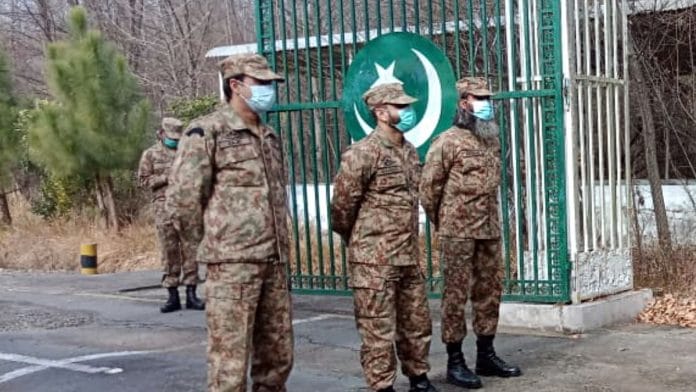New Delhi: Pakistan’s military is no longer limited to defense, it’s now playing a role in the economy as well.
“SIFC is just another form of military’s direct involvement in the political economy anchored in the belief that army’s discipline can turn around the economy,” political analyst Imtiaz Gul told ThePrint.
The SIFC, which operates under the direction of Prime Minister Shehbaz Sharif, is tasked with improving the ease of doing business in Pakistan and acting as a ‘single window’ for investors. Its composition includes not only top government officials such as provincial chief ministers and secretaries, but also the Army Chief. It was created in 2023 with the primary goal of boosting foreign direct investment (FDI) to $5 billion, facilitating a more collaborative environment between the public and private sectors, and breaking down the bureaucratic hurdles that have long hindered Pakistan’s economic growth.
While the creation of this body was heralded as a bold step toward economic rejuvenation amid Pakistan’s ongoing crisis, its composition has raised eyebrows.
The inclusion of military officials in key positions has sparked debates about the role of the military in economic decision-making and the balance of power between civilian governance and military influence.
Critics, such as journalist Hamid Mir, argue that the military’s involvement in economic affairs may not be the right solution.
“Pakistan Military Academy must make some changes in its curriculum and teach the cadets how to attract foreign investment. Military training has nothing to do with foreign investment or business management,” Mir told ThePrint.
Politicians, too, are concerned over the increasing involvement of the military and are questioning the role of the Parliament.
“Why are serving military officers employed in SIFC? They are paid for border security not for running businesses or investment facilitation. The Parliament’s silence on #SIFC & #APEX committees taking over major decision-making is concerning. Parliament has become irrelevant”, former MP Bushra Gohar wrote on X Monday.
Also read: Activist Zahack Tanvir arrested in Saudi Arabia for anti-Pakistan posts released, thanks India
Military’s expanding role in civilian affairs
The inclusion of military officers within the SIFC was touted as an attempt to bring stability and continuity to Pakistan’s economic policies, keeping in mind the country’s political instability and the shaky investor confidence in the wake of frequent changes in government.
Gulf Cooperation Council (GCC) nations—including Saudi Arabia, Qatar, and the UAE—have reportedly pressed for military-backed guarantees before making investments, reflecting a lack of trust in Pakistan’s political stability.
This move has, however, triggered concerns about the overreach of the military, particularly in relation to civilian governance. Critics are wary of the potential for military dominance over key economic policies, undermining democratic principles and accountability.
“Everybody knows that gradually military officials are being placed in various critical departments. We are seeing basically a repeat of what happened under General Pervez Musharraf’s era when hundreds of military officials were inducted into civilian departments,” Gul noted.
“It’s not just SIFC but institutions like NECTA, the Ministry of Information, PTA, the Panel Camera, and the Frequency Allocation Board—they are all being manned by army officials. It’s very clear that we are witnessing a trajectory of inducting military officials into civilian positions,” Gul noted.
Despite the military’s presence, the SIFC has yet to make a significant impact in attracting the expected levels of FDI.
“SIFC never performed well because it was stuffed with military officers”, according to Mir.
What is SIFC
PM Sharif, however, has defended the SIFC’s structure, calling it a “unified approach” to Pakistan’s economic challenges.
The council’s “single window” strategy is designed to streamline cooperation with GCC countries and unlock investment opportunities across various sectors, such as agriculture, energy, and technology. But even with this ambitious mandate, the SIFC’s success hinges on the ability to maintain a delicate balance between military influence and civilian oversight.
“While the military’s involvement can potentially bolster investor confidence, the long-term stability of Pakistan’s economy hinges on holistic policy reforms that address structural challenges,” a 2023 Diplomat article stated.
Pakistani business forums, too, have increasingly called for more private sector investments and the involvement of industry specialists in SIFC.
Amna Munawwar Awan, Senior Vice President of the Pakistan Business Forum (PBF), earlier in a steering committee meeting last month, called for offering priority sectors to the private sector for joint ventures with suitable partners.
“The state’s role should be to provide incentives and reduce bureaucratic barriers,” she said.
(Edited by Zinnia Ray Chaudhuri)
Also read: Zuckerberg afraid to fly over Pakistan. Someone tried to sentence him to death for blasphemy






